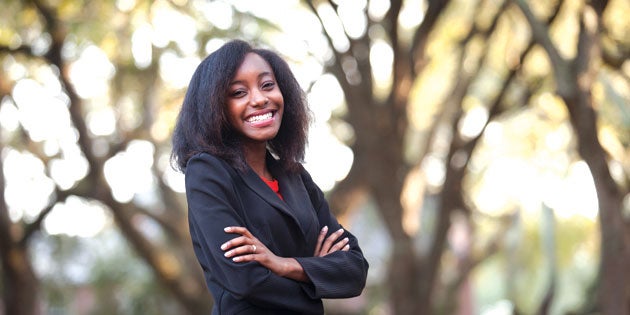It was cold, dark and rainy, but Meagan Dunham’s heart was as warm as it could be at the public launch of the College’s BOUNDLESS comprehensive campaign in November. Speaking to the 400+ members of the College community gathered in the Cistern Yard that night, she felt a sense of hope and possibility – a sense of confidence she’d never had before.
LEARN: Find out about the boundless opportunities for students at the College of Charleston.
“That was a groundbreaking moment for me. The impact I was making finally hit me,” says the sophomore, who spoke to the crowd about what scholarships have meant to her. “Looking out at all those people listening to what I had to say, I realized that what I said and did mattered. It was amazing. It really made me realize my potential – that I can go as far as I want to go and accomplish whatever I put my mind to.”
In high school back home in Marion, S.C., Dunham put her mind to going to college to study public health.
“I always liked school, and I always wanted to go to college – I just wanted to do something that was right for me,” she says. “I am the first person in my family to go to college, though, and I didn’t want to put the financial burden on my mom. I was so focused on the financial part of it – I just didn’t know if I could make it happen.”
But Dunham worked hard on her grades and her extracurricular activities (mostly community service), and – with the help of the Upward Bound Program – she applied for and was granted both a Pell Grant and a Legislative Incentive for Future Excellence (LIFE) Scholarship to go to the College of Charleston. As a first generation college student, she was also eligible to apply to the ROAR Scholars Program, which provides workshops and academic support to keep first-generation students on track for graduation.
Even with all the support, though, Dunham wasn’t sure she could hack it: She hadn’t factored in the cost of books and daily life, and she was going to have to take on multiple jobs in order to make it work.
LEARN: How to apply for the LIFE Scholarship.
“For the first two weeks on campus, I couldn’t focus on classes. I was so stressed out about finances, I couldn’t even focus enough to read my syllabi,” says the public health major. “When you’re stressed out about your financial means, you can’t focus on anything else. You can’t target your focus. All I could think about was how I could juggle two work-study jobs, a job somewhere on King Street and classes; how I was going to miss out on the whole college experience; how I wasn’t going to be able to go home for breaks because I’d have to be working. It was a lot to think about.”
She didn’t have to think long, though. Two weeks into her college career, Dunham was accepted into the Coca-Cola First Generation Scholars Program, granting her an additional $20,000 scholarship over four years, and received the James E. Clyburn/Rudolph Canzater Foundation Scholarship ($1,000, with the College granting a 2-to-1 matching scholarship).
“Those two scholarships changed everything,” says Dunham. “One minute I was worrying about paying for books and trying to figure out how to fit in jobs, and the next all I had to worry about was my education. It was amazing. It took so much stress off of me. I was able to focus on what is important – my education and my classes.”
LEARN: ROAR Scholars Program at the College of Charleston.
And that’s exactly what she did – and continues to do.
“I don’t slack off,” she says. “I know how lucky I am to have these scholarships. And everyone in my family is so excited for me. They really want this for me. They’re all rooting for me, so that makes me push so much harder.”
“Meagan is a hard worker, shows a great deal of interest in the subject matter and is well regarded by her peers,” agrees Paul Gangarosa, Dunham’s mentor and an adjunct professor in the Department of Health and Human Performance. “She is a pleasure to have in class and consistently exceeds my expectations. I feel better knowing that she is the next generation of public health professionals.”
Indeed, Dunham’s future in public health is wide open, which, she says, is something that Gangarosa helped her realize.
LEARN: Find out about the undergraduate Public Health Program at the College of Charleston.
“Dr. G. taught me basically that you can do whatever you want in this field – you just have to make it happen. And, with the resources and connections and tools he gives you to succeed, you can make it happen,” says Dunham, who has applied for an internship at the Center for Disease Control in Atlanta, Ga., this summer and hopes to go to Emory University’s Rollins School of Public Health upon graduating from the College. “He showed me that public health is a boundless field – you just need the education to
back it up.”
And, thanks to a few scholarships and the support of the College, Dunham is certainly getting the education to back up her goals.
“Since I’ve been here, making connections from class to class, I’ve realized that those connections really do make a whole education. That’s what is meant by a liberal arts education,” she says. “That’s what makes you a global student. And I think that’s important in life – you have to think roundly.”






